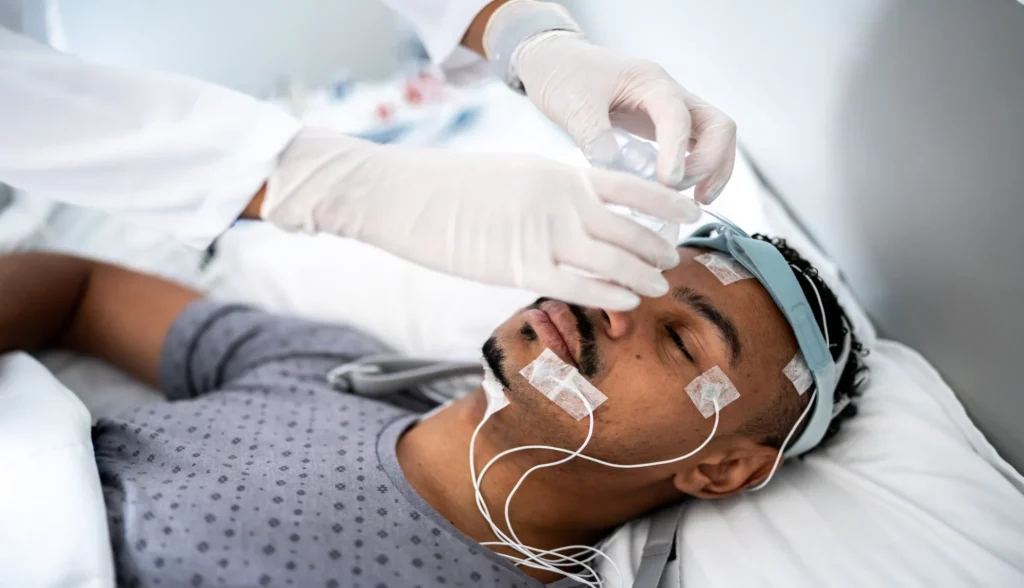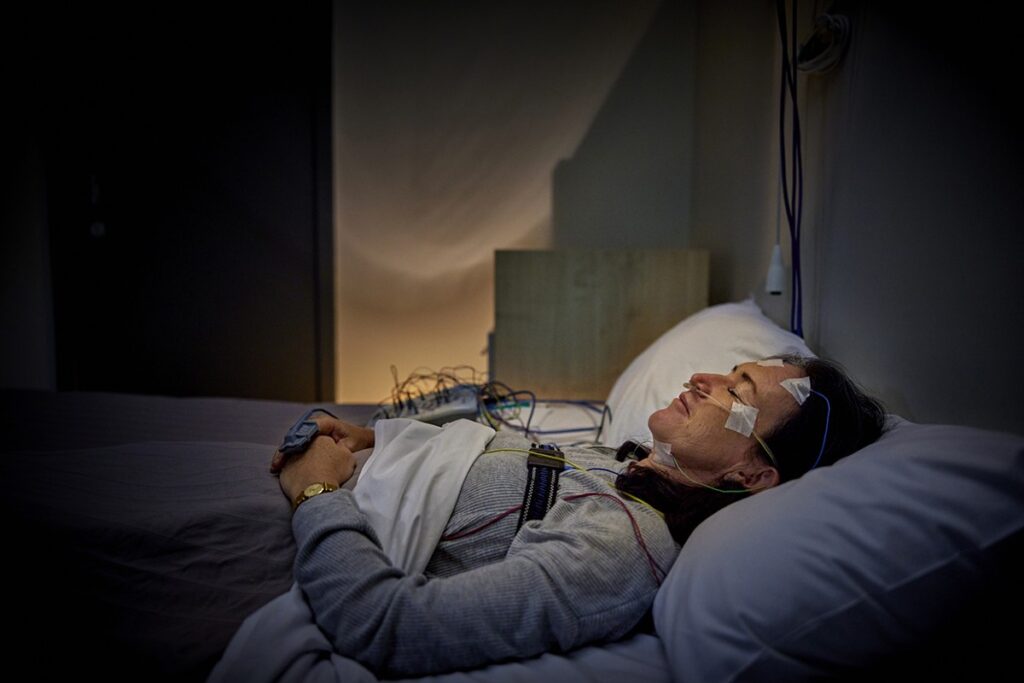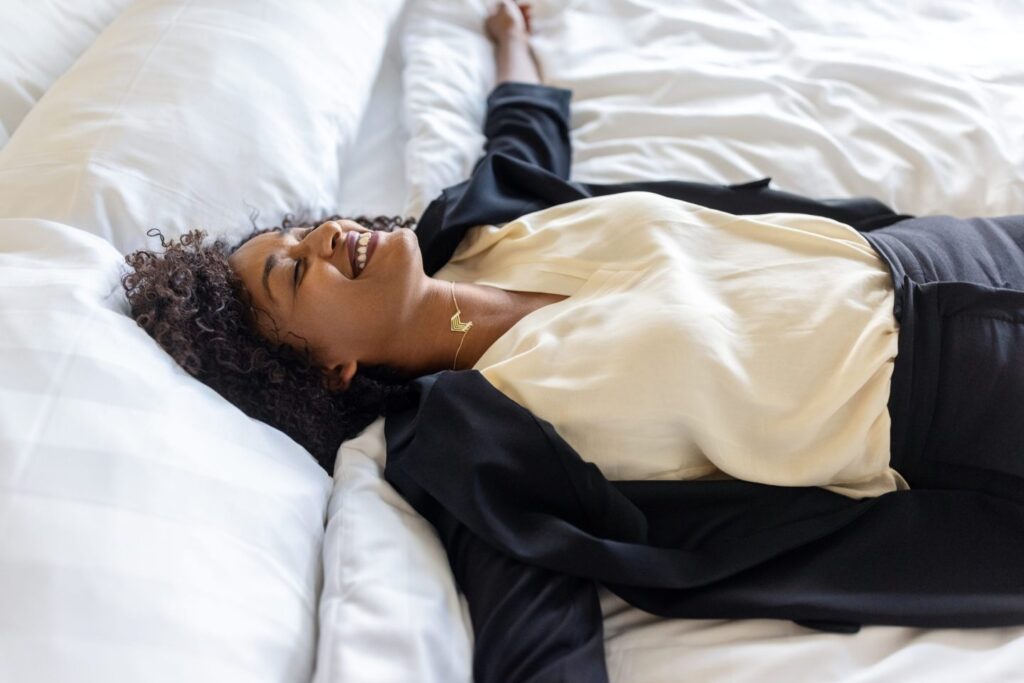Sleep studies are an important tool for diagnosing and treating sleep disorders. This makes it crucial for residents in cities like Sydney, Perth, Brisbane, and Melbourne to be aware of the costs involved when seeking these services. The price of sleep studies can vary greatly depending on several factors such as the type of study being conducted and the options available for insurance coverage.
Common Sleep Disorders Diagnosed
Some of the most common sleep disorders that can be identified through these studies include:
- Obstructive Sleep Apnoea (OSA) – characterised by breathing interruptions during sleep
- Insomnia – difficulty falling or staying asleep
- Narcolepsy – excessive daytime sleepiness
- Restless Leg Syndrome – uncomfortable sensations causing an urge to move the legs
- Sleep-Related Movement Disorders – involuntary movements disrupting sleep
Sleep study costs Sydney vary significantly based on several key factors. In-lab polysomnography studies range from $500 to $2,000, reflecting the comprehensive nature of overnight clinical monitoring and professional supervision.

Types of Sleep Studies Available
There are two main types of sleep studies that patients can choose from:
- In-Lab Studies: Conducted in specialised sleep clinics with comprehensive monitoring equipment and trained staff
- Home-Based Studies: Performed in the comfort of one’s home using portable diagnostic devices
The decision between these two options will not only affect the experience during the diagnosis but also have an impact on the costs involved.
Understanding the financial aspects, including Medicare coverage and private health insurance benefits, is essential for patients who want to make informed decisions about their journey towards better sleep health.
For those considering a sleep study in Sydney, Perth, Brisbane, or Melbourne, it’s important to note that investing in proper sleep diagnosis through appropriate testing methods can lead to effective treatment plans and improved quality of life.
Understanding Sleep Studies in Australia
Sleep studies across Australia, including Sydney, Hobart, Adelaide, and Canberra, offer two primary diagnostic pathways: in-lab polysomnography and home-based sleep tests. Each type serves specific diagnostic purposes and follows distinct procedures.
In-Lab Sleep Studies
In-lab sleep studies are conducted in specialised sleep clinics or hospitals and involve comprehensive monitoring through 15-20 sensors. These sensors measure brain waves, eye movements, and muscle activity while also recording breathing patterns, heart rate, and oxygen levels. The entire study is supervised by trained sleep technicians and typically takes one full night (around 8-10 hours) to complete.
Home-Based Sleep Studies
Home-based sleep studies utilise portable monitoring devices that can be used in the patient’s home. These studies focus on respiratory parameters and involve 4-7 sensors that record breathing patterns, oxygen levels, and heart rate. Unlike in-lab studies, home-based tests are self-administered with prior technical guidance and data is collected over 1-2 nights.
Learn more on: Bulk-Billed Sleep Apnea Tests in Sydney A Step-by-Step Guide
The Role of Sleep Studies in Diagnosing Conditions
Sleep studies play a crucial diagnostic role for multiple conditions:
Sleep Apnea
Sleep apnea is characterised by breathing interruptions during sleep. Sleep studies help identify these interruptions and measure their severity through the apnea-hypopnea index. Additionally, the studies determine oxygen desaturation levels which can have significant implications for overall health.
Insomnia
Insomnia refers to difficulty falling asleep or staying asleep. Sleep studies record sleep onset latency (the time it takes to fall asleep), monitor sleep architecture (the structure of different sleep stages), and identify sleep fragmentation patterns (repeated awakenings throughout the night).
Narcolepsy
Narcolepsy is a disorder characterised by excessive daytime sleepiness and sudden episodes of sleep. Sleep studies evaluate rapid eye movement (REM) sleep patterns, measure sleep latency (the time it takes to transition from wakefulness to sleep), and identify unusual sleep-wake transitions.
Choosing Between In-Lab and Home-Based Studies
The choice between in-lab and home-based studies depends on several factors:
- Suspected conditions
- Medical history
- Specialist recommendations
In-lab studies provide detailed neurological data while home studies focus on respiratory parameters. Both types of tests have their advantages and limitations.
For those considering a sleep study in Hobart, Adelaide, or Canberra, it’s essential to consult with a healthcare professional to determine the most suitable option based on individual health needs.

Breakdown of Sleep Study Costs in Sydney
Home-based sleep studies present a more affordable option, with prices between $149 and $420. These studies utilise portable diagnostic equipment for monitoring sleep patterns in familiar surroundings.
Factors Influencing Cost Variations
The cost variations stem from multiple factors:
- Location: Inner-city sleep clinics often charge higher rates compared to suburban facilities
- Equipment sophistication: Advanced monitoring technology increases the study cost
- Duration: Extended monitoring periods require additional resources
- Staff expertise: Specialist involvement and interpretation fees
- Facility amenities: Private rooms and additional comfort features affect pricing
Additional Cost Considerations
Additional cost considerations include:
- Pre-study consultations
- Follow-up appointments
- Equipment calibration
- Data analysis and reporting
- Medical interpretation fees
Private vs Public Facilities
Private facilities typically charge higher rates but offer enhanced privacy and reduced waiting times. Public hospital sleep clinics maintain standardised pricing structures aligned with healthcare regulations.
Impact of Monitoring Type on Cost
The type of monitoring required impacts the final cost:
- Basic monitoring (breathing, heart rate) – lower cost range
- Complex studies (brain activity, muscle movement) – higher cost range
- Specialised testing (multiple night studies) – premium pricing
Medicare and Insurance Coverage for Sleep Studies
Medicare provides substantial coverage for sleep studies when specific eligibility criteria are met. A valid GP referral alongside documented symptoms of sleep disorders qualifies patients for Medicare Benefits Schedule (MBS) item numbers, potentially reducing out-of-pocket expenses. Find more about symptoms on https://www.open.edu/openlearn/mod/oucontent/view.php?id=28148§ion=1.2
Medicare Coverage Requirements:
- Valid referral from a GP or specialist
- Documented sleep disorder symptoms
- Meeting specific MBS criteria for sleep investigations
- Initial consultation with a sleep physician
Private health insurance offers additional coverage options for sleep studies and related treatments. The level of cover depends on the specific policy and provider:
Private Health Insurance Benefits:
- Partial or full coverage for in-lab sleep studies
- CPAP equipment purchase or rental assistance
- Ongoing therapy support services
- Regular equipment maintenance and replacements
High-risk patients meeting specific criteria may access bulk-billing options through selected providers. Qualifying conditions include:
- Severe sleep apnoea symptoms
- Chronic respiratory conditions
- Cardiovascular complications
- Body Mass Index (BMI) above 35
The exact rebate amount varies based on the type of sleep study and individual circumstances. Private health insurance providers typically require a minimum waiting period before claims can be processed for sleep-related services.
Bulk-Billing Availability:
- Limited to specific clinics and hospitals
- Subject to doctor’s assessment
- Requires complete medical history
- May need additional specialist referrals
Benefits and Limitations of Home-Based vs In-Lab Sleep Studies
Home-based sleep studies offer distinct advantages for patients seeking comfortable diagnostic experiences. The familiar environment of one’s bedroom reduces anxiety levels associated with sleep monitoring. Patients maintain their regular bedtime routines, leading to more natural sleep patterns during the assessment. Results typically arrive within 48 hours, enabling swift progression to treatment planning.
Key Benefits of Home Sleep Studies:
- Natural sleep environment
- Reduced testing anxiety
- Faster results processing
- Cost-effective solution
- Minimal disruption to daily routines
In-lab sleep studies provide comprehensive diagnostic capabilities through advanced monitoring equipment and trained technician supervision. These controlled environments allow for detailed observation of:
- Brain wave activity
- Eye movements
- Muscle tension
- Heart rhythm patterns
- Blood oxygen levels
- Body positioning
Choosing Between Options:
The selection between home-based and in-lab studies depends on specific patient factors:
- Medical History: Complex sleep disorders require in-lab monitoring
- Physical Limitations: Self-application of sensors impacts home study suitability
- Schedule Flexibility: Work commitments might favour home-based options
- Insurance Coverage: Available benefits influence testing choices
- Clinical Requirements: Physician recommendations based on symptoms
Sleep specialists assess these factors to determine the most appropriate testing method for each patient’s circumstances.
Preparation Requirements for Sleep Studies
Proper preparation plays a vital role in obtaining accurate sleep study results. Patients scheduled for sleep studies in Sydney must follow specific guidelines to ensure optimal testing conditions.
General Pre-Study Requirements:
- Maintain regular sleep patterns 2-3 days before the test
- Avoid caffeine and alcohol consumption on test day
- Skip naps during the day of the study
- Remove nail polish and artificial nails
- Avoid using hair products, lotions, or oils
- Take regular medications unless advised otherwise
Home-Based Sleep Study Preparation:
- Schedule equipment collection during business hours
- Wear comfortable, loose-fitting sleepwear
- Follow sensor attachment instructions carefully
- Keep detailed notes of sleep times and positions
- Ensure testing environment is quiet and comfortable
In-Lab Sleep Study Guidelines:
- Arrive at the sleep centre 1-2 hours before bedtime
- Bring personal sleepwear and toiletries
- Pack any required medications
- Bring CPAP equipment if currently using
- Remove contact lenses before sleeping
Essential Items to Pack:
- Comfortable nightwear
- Change of clothes
- Personal toiletries
- Reading material
- Regular medications
- Insurance cards and referral documents
The sleep technician will attach monitoring sensors and explain the overnight recording process. These sensors track various physiological parameters including brain activity, eye movements, heart rate, and breathing patterns. To find more about brain click here.
Comprehensive Patient Pathway Offered by Providers Like Air Liquide Healthcare Sleep Solutions
Air Liquide Healthcare Sleep Solutions is Australia’s largest provider of sleep apnea studies and therapy, offering a comprehensive approach to managing sleep disorders. Their integrated method includes:
1. Initial Consultation and Diagnosis
- Professional sleep assessment
- Selection of appropriate diagnostic method
- Coordination with referring healthcare providers
2. Treatment Implementation
- Customised CPAP therapy initiation
- Equipment selection and fitting
- Personalised pressure settings adjustment
3. Ongoing Management Support
- Regular progress monitoring
- Equipment maintenance guidance
- Therapy optimisation as needed
The service model integrates seamlessly with leading CPAP equipment manufacturers through established partnerships. This integration enables patients to access the latest sleep therapy technology while receiving expert guidance from sleep specialists.
Air Liquide Healthcare’s extensive network includes respected sleep brands such as SNORE Australia, Healthy Sleep Solutions, and Sleep Disorder Australia (SDCA). This broad coverage ensures accessible treatment options across Sydney locations.
The patient pathway includes specialised CPAP titration programs designed to achieve optimal therapeutic outcomes. Sleep specialists conduct regular check-ups to monitor treatment effectiveness and make necessary adjustments, creating a dynamic treatment plan that evolves with patient needs.
Making an Informed Decision Before Booking a Sleep Study in Sydney
Selecting the right sleep study requires careful consideration of multiple factors to ensure optimal diagnostic outcomes. A thorough evaluation of these key elements helps patients make well-informed decisions:
Essential Considerations:
- Cost variations between in-lab and home-based studies
- Personal comfort level with different testing environments
- Medicare eligibility status and private health insurance coverage
- Specific medical conditions requiring specialised monitoring
- Distance and accessibility to sleep study facilities
The selection process benefits from direct consultation with healthcare providers who can assess individual circumstances and recommend appropriate diagnostic pathways. Patients should request comprehensive cost breakdowns, including additional fees for equipment rental, specialist consultations, or follow-up appointments. This detailed understanding prevents unexpected expenses while ensuring access to necessary diagnostic services.
Cost Management Strategies:
- Request detailed quotes from multiple providers
- Check for available bulk-billing options
- Verify exact out-of-pocket expenses
- Investigate payment plan possibilities
- Review included post-study consultation fees
Conclusion
Sleep studies are an important investment in the health and well-being of Sydney residents who have sleep-related issues. Choosing between home-based and in-lab studies can have a big impact on both diagnosis results and financial factors.
Consulting with qualified healthcare providers is essential for making an informed decision about sleep studies. These medical professionals have the knowledge to:
- Assess individual sleep disorder symptoms
- Evaluate medical history and risk factors
- Recommend the most appropriate diagnostic approach
- Explain Medicare and insurance coverage options
The journey to better sleep begins with understanding the available options and their costs. By seeking proper consultation and carefully considering different diagnostic choices, patients can find the right sleep study solution that meets their medical needs and financial situation.
Investing in professional sleep diagnosis leads to better health outcomes and an improved quality of life for those in Sydney who suffer from sleep disorders.
[Ready to book your sleep study? Contact a healthcare provider to discuss your specific needs and find the most suitable diagnostic approach.]

